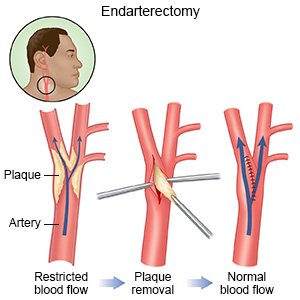Femoral Artery Endarterectomy
Medically reviewed by Drugs.com. Last updated on Apr 6, 2025.
What do I need to know about femoral artery endarterectomy (FAE)?
FAE is surgery to remove plaque (fatty deposits) from inside your femoral artery. The femoral artery is a large blood vessel found near your groin. It supplies blood to your legs. Plaque may build up inside your femoral artery and decrease blood flow to your legs.
How do I prepare for FAE?
- Your surgeon will tell you how to prepare. Your surgeon may tell you not to eat or drink anything after midnight on the day of your surgery. Arrange to have someone drive you home when you are discharged.
- Tell your surgeon about all medicines you currently take. Your surgeon will tell you if you need to stop any medicine for surgery, and when to stop. Your surgeon will tell you if you need to take aspirin or a blood-thinning medicine before surgery. This medicine will help stop clots from forming in your blood. Your surgeon will tell you which medicines to take or not take on the day of surgery.
- Tell your surgeon about any allergies you have, including to anesthesia or medicines.
- You may need blood tests before surgery. You may also need an ultrasound, CT scan, or MRI. Tell the healthcare provider if you have ever had an allergic reaction to contrast liquid. Do not enter the MRI room with anything metal. The MRI machine uses a powerful magnet. Metal can cause serious injury from the magnet. Tell the healthcare provider if you have any metal in or on your body. The tests may be done to check the plaques in your femoral artery. Angiography may be used to check the blood flow from your femoral artery to your legs.
Drugs used to treat this and similar conditions
Crestor
Crestor (rosuvastatin) is used to treat high cholesterol and high triglycerides in the blood ...
Plavix
Plavix (clopidogrel) is used to prevent blood clots after a recent heart attack or stroke. Includes ...
Omvoh
Omvoh is used to treat moderate to severe ulcerative colitis or Crohn's disease in adults. This ...
Tylenol
Tylenol is a pain reliever and a fever reducer used to treat many conditions such as headaches ...
Dilaudid
Dilaudid (hydromorphone) is a narcotic pain reliever used to treat moderate to severe pain ...
Acetaminophen/hydrocodone
The combination of hydrocodone and acetaminophen is used to relieve moderate to severe pain ...
Hydrocodone
Hydrocodone (Hysingla ER and Zohydro ER) is used for around-the-clock treatment of severe pain ...
Oxycodone
Oxycodone is an opioid analgesic used to treat moderate to severe pain; it has a high potential for ...
Qutenza
Qutenza patches are used to treat neuropathic pain associated with postherpetic neuralgia and ...
Pentoxifylline
Pentoxifylline systemic is used for intermittent claudication
What will happen during FAE?
- You will be given general anesthesia to keep you asleep and free from pain during surgery. Your surgeon will make an incision over the femoral artery near your groin. Clamps will be applied to the artery to stop blood flow and mark the area that has plaque. Your surgeon will make an incision in the artery. The plaque will be separated from the artery wall and removed.
- Your surgeon may inject saline into the artery to check for any remaining plaque. This will also show if blood will be able to flow through the artery properly. The artery incision will be closed or put back together with a patch. The patch may be made from animal tissue or a piece of your own vein. The patch helps keep the artery open so it does not become too narrow again.
- Your surgeon will remove the clamps and check the blood flow in your artery. A drain may be used to remove extra blood and fluid from around your artery. Your groin incision will be closed with stitches and covered with a bandage.
 |
What should I expect after FAE?
- You will be taken to a recovery room until you are fully awake. Healthcare providers will monitor you closely for any problems. You may need to stay in the hospital overnight or longer.
- Talk to healthcare providers before you get up the first time. They may need to help you stand up safely. When you are able to get up on your own, sit or lie down right away if you feel weak or dizzy. Then press the call light button to let healthcare providers know you need help.
- You may need to take blood thinners and aspirin. Your surgeon will tell you how long you will need these medicines.
What are the risks of FAE?
You may bleed more than expected. Your incision site may develop an infection or hematoma (collection of blood). You may develop a blood clot. Nerves or other structures near the surgery site may be damaged. Your artery may be damaged or weakened. This can cause a rupture. An artery rupture is life-threatening.
Care Agreement
You have the right to help plan your care. Learn about your health condition and how it may be treated. Discuss treatment options with your healthcare providers to decide what care you want to receive. You always have the right to refuse treatment. The above information is an educational aid only. It is not intended as medical advice for individual conditions or treatments. Talk to your doctor, nurse or pharmacist before following any medical regimen to see if it is safe and effective for you.© Copyright Merative 2025 Information is for End User's use only and may not be sold, redistributed or otherwise used for commercial purposes.
Further information
Always consult your healthcare provider to ensure the information displayed on this page applies to your personal circumstances.
